CABI has been working with Zirobwe Agali-Awamu Agribusiness Training Association (ZAABTA), the Ministry of Agriculture, Animal Industry and Fisheries (MAAIF), the National Agricultural Research Organisation (NARO), and Integrated Seed Sector Development (ISSD) in Uganda to help smallholder farmers meet standards for Quality Declared Seed (QDS) production.

The two-day training, organized under the PlantwisePlus programme, was conducted to help strengthen seed quality assurance practices among district agricultural officers and seed producing groups in Luwero, Kayunga, and Nakaseke.
Specifically, the training was designed to build the capacity of district technical staff in supporting Local Seed Business (LSB) groups to meet the required standards for QDS production, thereby ensuring the sustainability of these businesses beyond the support of the PlantwisePlus programme.
A world where smallholder farmers are empowered
PlantwisePlus envisions a world where smallholder farmers are empowered to manage evolving plant health threats, increase their incomes, improve food security and safety, and reduce biodiversity loss.
It supports smallholder farmers across three key impact pathways including pest preparedness, pesticide risk reduction and farmer advisory.
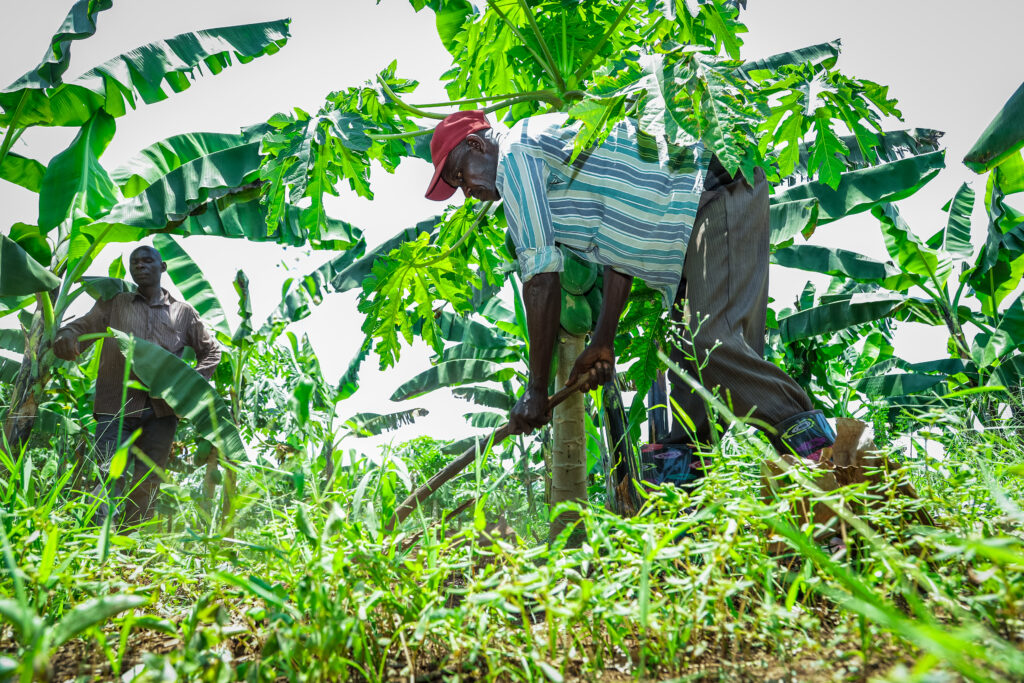
The training was facilitated by Seed Inspectors and Regulators from the Ministry of Agriculture, Animal Industry and Fisheries (MAAIF) and focused on key aspects of quality assurance within the LSB model.
The training enhanced the technical competence of district agricultural extension staff in providing continuous coaching, inspection, and support to LSB groups as they strive toward full certification and compliance to market requirements.
In total, 11 district extension staff (7 men and 4 women) participated in the training, in addition to 19 farmer representatives (15 men and 4 women) from the 8 youth-dominated LSB groups affiliated with ZAABTA.
Sharpening their knowledge and skills in QDS production
Caroline Aliamo, CABI’s Projects Officer based in Entebbe, Uganda, said, “The inclusion of farmer representatives was intended to further sharpen their knowledge and skills in QDS production, as a way of promoting a shared understanding between producers and regulators on best practices in seed quality assurance.”
She added that CABI, in collaboration with ZAABTA and ISSD, held a workshop where LSB groups along with their respective Agriculture Extension Officers and Inspectors from MAAIF, came together to review progress, share experiences, and reflect on scaling strategies and promote peer learning among the groups.
This supported ten youth-led groups affiliated with ZAABTA to establish and manage seed enterprises through the LSB model. The initiative aims to empower women, men and youth with viable seed businesses that generate income for themselves while promoting access to quality, locally demanded seed within their communities.
To support the groups’ continued learning and prepare them for the 2025A season, CABI provided 7 groups with foundation seed and inputs such as fertilizers and insecticides sufficient for establishing 0.5-acre demonstration plots during the 2024B season. ISSD provided technical support to implement the agronomic practices.
Baseline understanding of the groups’ capacity needs
Christine Alokit, Communication and Extension Scientist at CABI, said, “In both engagements (training and review workshop), participants were asked to share their expectations, which provided valuable insights into their learning interests and gave trainers and facilitators a baseline understanding of the groups’ capacity needs.
“Each LSB group also gave a brief update on the progress of their seed production activities, highlighting both achievements and challenges encountered. These presentations offered a clear picture of the status of LSB implementation and enabled the groups to learn from each other and trainers and facilitators to tailor the training objectives to address specific gaps and support needs.
“From the group presentations, it was evident that some LSBs struggled to meet certain certification requirements. In response, the trainers and facilitators devoted more time to key areas such as collaboration with extension officers whose role includes coaching and mentoring LSB groups and equipping them with practical agronomic practices that support compliance with seed quality certification standards.”
Close attention to critical elements of inspection
Trainees were also encouraged to pay close attention to critical elements of inspection, including verifying crop identity, crop health, genetic purity, pest and disease management, and adherence to recommended isolation distances.
It was further highlighted that following each inspection, the Agriculture Extension Officer is expected to prepare a report to be reviewed and signed by the LSB’s Quality Assurance Committee. This step serves as formal documentation of the inspection findings and the agreed-upon recommendations.
Record-keeping was also emphasized as a vital component of the compliance. Trainers stressed the importance of maintaining accurate and up-to-date records, including seed production logs and field management records, as these are essential for certification and traceability.
Improving their understanding of the seed certification process
By the end of the training, participants had improved their understanding of the seed certification process and were in position to: conduct internal quality checks ahead of external inspections, identify and address deviations in seed production, maintain high standards of documentation, and appreciate the value of collaborating with relevant stakeholders.
Other training being conducted by CABI in Uganda under the PlantwisePlus programme includes helping agro dealers be more aware of pesticide safety and biopesticides, which are safer to use and more environmentally friendly.
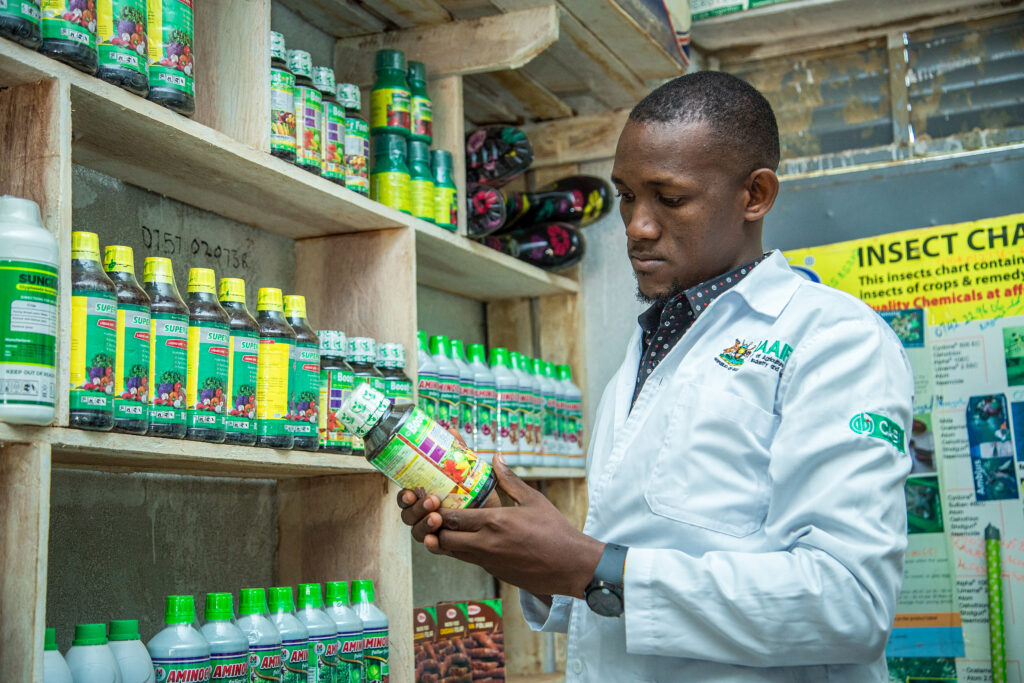
Now agro dealers have changed the way they sell pesticides. They have stopped selling more highly hazardous products and instead promote lower-risk pesticides. They also advocate the use of personal protective equipment (PPE), which has now improved among farmers.
Relevant stories
‘CABI and Uganda work towards plans for greater sustainable food security.’
‘Youth in agriculture: Meet Anthony Ssenyonga, an agri-entrepreneur in Uganda.’
‘How agro-dealer training in Uganda is reducing pesticide risks and making farming safer.’
Additional information
PlantwisePlus gratefully acknowledges the financial support of the Directorate-General for International Cooperation, Netherlands (DGIS); European Commission Directorate General for International Partnerships (INTPA); UK International Development from the UK government; and the Swiss Agency for Development and Cooperation (SDC).
1 Comment
Leave a Reply
Related News & Blogs
5 ways digital agriculture tools are transforming pest management
Finding accurate, locally contextualised information at the right time is essential for tackling crop pests. Digital agriculture tools are helping farmers and those who advise them by putting expert knowledge directly in their hands. 1. Early pest diag…
12 February 2026

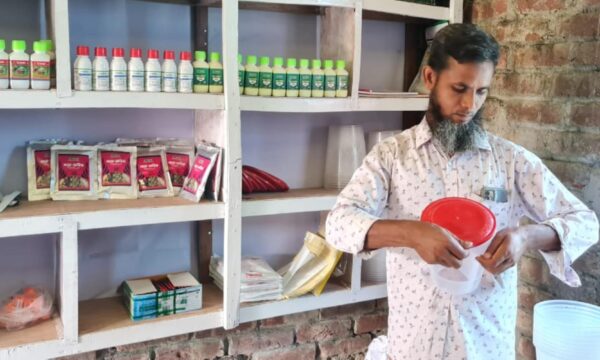
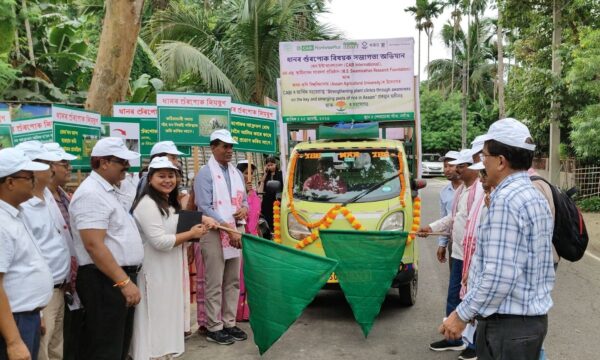
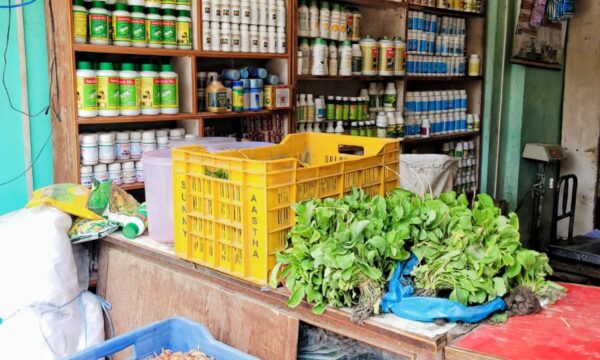
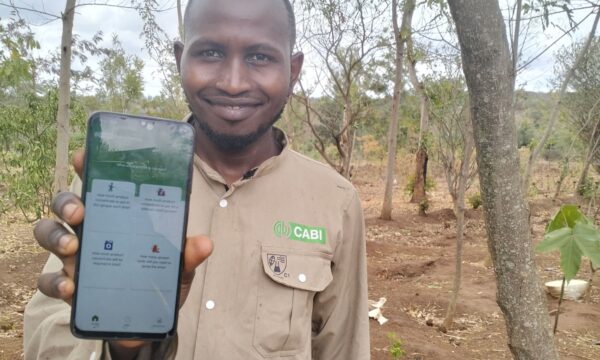
Thanks Plant wise Kayunga Bbaale also benefited